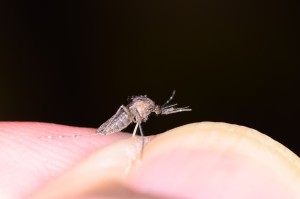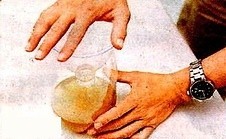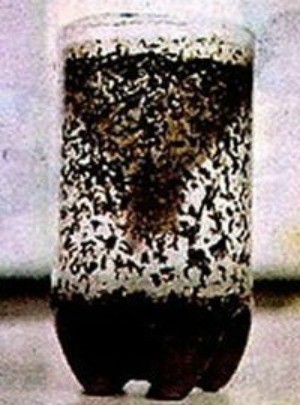
The most common homemade mosquito trap is made following these steps:
Cut the top of a two-liter plastic bottle and then fit the inverted top into the lower portion of the bottle. Seal together with packing tape.
Glue black paper around the outside of the bottle.
Bring 1 cup sugar and 1 cup water to a boil to dissolve the sugar.
Add 2 cups cool water and let the mixture cool to 90 degrees F (32 degrees C). Then add 1 Tsp. active dry yeast.
Pour the sugar mixture into the bottom of the trap and place it outside to catch mosquitos.
Read on for more mosquito trap ideas as well as feedback about their effectiveness.
This page contains the following solutions.
Because mosquitoes are attracted to the CO2 we breathe out, I started looking for ideas that used CO2 as the bait for the mosquito trap. I did think of dry ice but it does dissipate fairly quickly.
I found a cached link on Google here. It seems to be active again now. I've rewritten the instructions some and hopefully it will work as well.
Thanks to the students for their hard work on this project. I've used some of their photos for illustration.
Take a 2 liter soda bottle. Cut off the top right below where it starts to narrow for the top, invert and place inside the lower half.
Make a simple sugar syrup.
Bring 1 cup of the water to a boil.
Dissolve the sugar into the boiling water.
Once the sugar is dissolved completely, remove the pan from the heat. Stir in 2 cups cool water, stir well.
Check the temperature of the syrup to make sure it is no hotter than 90 degrees F, if hotter, let cool to 90 degrees F, add 1 tsp. active dry yeast, no need to mix. Put syrup in the bottom part of the bottle, using the cut off neck piece, leave in place.
Be sure to seal the two parts of the bottle with the tape. The fermenting yeast will release carbon dioxide. Put black paper around the bottle since mosquitoes like dark places and carbon dioxide. This mosquito trap will then start working.
TIPS: Put the trap in a dark and humid place for 2 weeks, you'll see the effect. You'll have to replace the sugar water + yeast solution every 2 weeks.


This links tells the direction and what to do with the black pepper. Here is a cut-n-paste of the the info on the paper:
Put black paper around the bottle since mosquitoes like dark places and carbon dioxide. This mosquito trap will then start working.
Mosquitoes fly around the corner, so the best place to place the trap is at some dark corner.
It also says this about placement and longevity - Tips: Put the trap in some dark and humid place for 2 weeks, you'll see the effect. You'll have to replace the sugar water + yeast solution every 2 weeks.
On your website, someone posted how to get rid of mosquitoes using a plastic bottle. Wonderful idea, but even better, adding vinegar and sugar water will not just get rid of mosquitoes, but pesky annoying gnats too.
By twinheart13
Today, I made two mosquito traps from soda bottles. I did not have any black construction paper but did have black ground cloth. I cut a piece to cover the bottle and stapled the fabric on the bottom so it would sit flat. This should last longer than paper.
Here are the questions asked by community members. Read on to see the answers provided by the ThriftyFun community.
How do you know your "trap" is not just attracting more mosquitoes?
By KimS from Russellville, AR
They do attract mosquitoes, that's their job. They attract the females (which are the biters), and thus there is a cumulative impact on decreasing the mosquito population as successive crops of females are wiped out.
We use CO2 traps and live on the water on the Texas Gulf Coast. We have mosquitoes up to 12 months a year and I can attest to their efficacy.
The key is knowing how to use them. Never put them near your outdoor seating areas, they attract mosquitoes. Seems self-evident, but people who complain about traps usually have them too close to their areas. About 30 feet away, preferably upwind, seems to work best for us.
If I'm on the lee side of the house working in the yard or garden, I'll wear a DEET repellant, but for everyday mosquito control; sitting out in the morning with coffee, hanging out in the hammock during the day, or sitting on the deck for happy hour until after dusk, the CO2 trap works. We don't have to spray pesticides on us or our wetland marsh. We don't want to kill the dragonflies and butterflies, etc.
Give it a try, how cheap and easy is it? Much cheaper than the propane powered SkeeterVacs, which also work wonderfully, when used correctly. If you don't like it or it's ineffective, you're out a 2 liter bottle and a package of yeast.
How do the mosquitoes die? Can it just drink it and fly away?
By RJ I. from Manila, Philippines
Here in northern Canada, we have lots of mosquitoes, and let me tell you that so called "mosquito traps" do not work. The only repellants that work are those with Deet. Nothing else works. However, the new products by Off that are the clip ons you wear on your belt, or the Off Lamps, that have little pads that are heated with a candle also work.
The same type of thing is available here in a product called a Thermocell, which heats the pad with a butane heater. This is good for using in places where you can't burn a candle. The coils that one burns are also pretty effective, but the other products are better. Do not waste your time, effort, or money on anything else, because other products do not work.
They drown in the water, so its important to keep the water level up to the original mark, about half way up the bottle. From experience with my fly trap the black painted area tricks them going further down the bottle to try and get out, they head towards the light. These things do work if you maintain them, I'd add more of the active ingredient every week or so to keep it going, even try masking the bottom half and spray paint the top half black.
They cannot fly out and die quickly. We have several restaurants in Hawaii where these are used and work quite well!
Do not believe this chemical head. Use the traps. There are lots of natural repellent. Dont put cancer-causing chemicals all over your body.
I've used 2 liter bottle traps for years and YES mine work well. Most people don't know the tricks. Most Mosquitos will vanish in the mix so counting bodies don't work. I carry a couple to the woods when I'm working and I can assure you mine work. First the mix may take a day to ripen. Brown sugar and water. Hot water kills yeast so if the water is hot the mix is bad. Next they cut the bottle wrong. Fill empty bottles with water cap then stick a knife into the bottle at the lable top line. Pour water out. Use scissors cut the bottle top off using the label as a guide. Add mix. Remove the colored part remaining from the lid. Invert push down into bottle leaveing 1 inch above bottle cut line. Tape both parts to seal funnel. Stick in a empty 1 gallon can. Hang in a barn or other dry place. Don't bother with the trap. Next time you visit the barn you will notice the Mosquitos didn't show up for lunch.
Do the dead mosquitos leave an odor when dead in large quantity like in fly traps?
How do you build a mosquito trap?
By Karilynn from Lambert, MT
I did an internship with the Entomology Dept at UC Davis, many moons ago. I assisted with mosquito research. I recall our mosquito traps were about the size of a small coffee can, with a bottom, and a tapered top. We would hang them from tree limbs, and put a piece (about 3x3 inches) of dry ice in the can. The carbon dioxide would attract the mosquitoes and we would get plenty of samples in out traps.